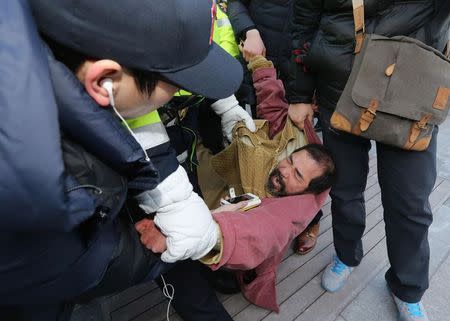U.S. believed security for Seoul ambassador adequate before attack
By David Brunnstrom WASHINGTON (Reuters) - U.S. government experts believed security for the U.S. ambassador to South Korea was adequate before he was slashed by a knife-wielding attacker, in spite of current high tensions with North Korea, the State Department said on Friday. U.S. ambassador Mark Lippert needed 80 stitches after his face was cut at a forum discussing Korean unification in Seoul on Thursday by an assailant who had made multiple visits to North Korea between 1999 and 2007. [ID:nL4N0W8062} South Korean police said they were investigating possible links between the attack and the visits, but State Department spokeswoman Marie Harf said the motive was still not known. "We are still getting all the facts about how people were screened to get in to this event, how they were on the list, how they were allowed in," she told a regular news briefing, adding that the embassy was coordinating with the Korean-led probe. The attack was carried out by 55-year-old Korean nationalist Kim Ki-jong, now under arrest, who said he was protesting against annual U.S.-South Korean military exercises that began this week. Harf said security for U.S. ambassadors around the world was based on assessments by experts from the department's Bureau of Diplomatic Security and said Lippert had been assigned a single South Korean National Police bodyguard. Since the attack, Harf said, Lippert's security had been boosted with several other South Korean police officers and the United States would "see if anything else needs to be done." She said she had not heard of plans to boost diplomatic security elsewhere in the world following the attack. Asked if Seoul should have been considered a high-risk area, given increased tensions with North Korea over current U.S.-South Korea military exercises and a cyber-hacking dispute sparked by a U.S. movie Pyongyang considered insulting to its leader, Harf replied, referring to U.S. security experts: "Their professional judgment was that it wasn't." Other South Korean police were present at the time of the attack but not at the request of the U.S. embassy. "OUTRAGEOUSLY CALLOUS" Lippert was in stable condition and recovering from the attack but was expected to remain in the hospital until Tuesday or Wednesday, she added. North Korean state media has said the attack against Lippert was "deserved punishment" for the military drills, calling the assault "the knife of justice." Harf called the North Korean statement "outrageously callous but unfortunately consistent with the nature of this regime and its rhetoric." Lippert arrived in Seoul last year and has a reputation for an informal, approachable style. He would usually walk the short distance from his residence to the embassy and could also be seen walking his basset hound, Grigsby, in central Seoul. Two retired former U.S. ambassadors said security was largely a judgment call for individual ambassadors and there was a constant trade off between security and the desire to be seen as open and accessible. "The only way you are going to stay perfectly safe is if you stay holed up in the embassy and I would argue that the ambassador's not doing his job in those circumstances," said Steven Pifer, a former ambassador to Ukraine now at the Brookings Institution think tank. James Jones, who had an eight-person personal security detail in Mexico, said South Korea should not be a major security issue "other than what overflows from North Korea." "Your security details will always want to have more security than you think is necessary, than you think is politically wise, so you make the decision on whether you want more or less and they have to abide by that decision," he said. (Reporting by David Brunnstrom; Editing by Jason Szep and Ken Wills)

 Yahoo News
Yahoo News 

